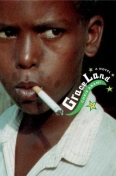BKMT READING GUIDES
Graceland
by Christopher Abani
Hardcover : 336 pages
0 club reading this now
1 member has read this book
"Abani's intensely visual style--and his sense of ...
Introduction
In this dazzling debut by a singular new talent, the sprawling, swampy, cacophonous city of Lagos, Nigeria, provides the backdrop to the story of Elvis, a teenage Elvis impersonator hoping to make his way out of the ghetto.
"Abani's intensely visual style--and his sense of humor--convert the stuff of hopelessness into the stuff of hope."--San Francisco Chronicle
"Extraordinary...This book works brilliantly in two ways. As a convincing and unpatronizing record of life in a poor Nigerian slum, and as a frighteningly honest insight into a world skewed by casual violence, it's wonderful...And for all the horrors, there are sweet scenes in Graceland too, and they're a thousand times better for being entirely unsentimental...Lovely." --The New York Times Book Review
Discussion Questions
Questions from Publisher's Reading Guide:1. At the start of the novel Elvis Oke works as an Elvis Presley impersonator where he is greeted by odd stares and given money to stop dancing and singing. What is the influence of Elvis Presley on Elvis Oke’s life? How is Elvis Presley symbolic of American dreams and culture? What is the role of American culture in the novel? What is the significance of the title? Where is Elvis Oke’s land of grace? 2. At the start and conclusion of each chapter are excerpts from Beatrice’s journal- “things she wants to remember in her next life.” Since the reader barely meets her, what can you learn about her through these excerpts? Why would she need them in her next life? How could the journal help Elvis and why does he carry it with him? 3. “Elvis had read a newspaper editorial that stated, rather proudly, that Nigeria had a higher percentage of millionaires than nearly any other country in the world…. The editorial fails to mention that …Nigeria also had a higher percentage of poor people than nearly any other country in the world.” Discuss the paradox that is Lagos. Consider Elvis’s thoughts on Lagos, “How could a place be so ugly and violent yet beautiful at the same time?” 4. Redemption says that the “States is de place where dreams come true, not like dis Lagos dat betray your dreams.” How does this statement define how Redemption and Elvis view America? Do they have an idealistic view of America?
5. Abani’s choices of names define “a culture where your name was selected with care by your family and given to you as a talisman.” Discuss the irony of the names chosen for some of the characters –i.e. Elvis, Sunday, Comfort, King of all Beggars, Innocent, and Redemption. 6. When Elvis confronts his father about his drinking they have an emotional conversation and Sunday tells him, “Everything for us fell apart when your mother died.” Explain how Beatrice was the center of the family. What was the influence she had over Elvis and Sunday? Discuss how this quote is inspired by the title of Chinua Achebe’s classic novel about Nigeria’s transition to colonialism, Things Fall Apart? 7. Literature, film and music play a large role in Elvis’s life. What does Elvis’s interest in the arts reveal about his character? How does his choices in literature and film help him to escape the brutal realities of Lagos? 8. From being sexually abused, to working as a dancer, to having a tryst with a 13 year old as he works as her caretaker, Elvis has had various experiences involving sex. How is sex presented in the novel? How have these episodes defined his coming of age? 9. Among Elvis’s acquaintances are the street hustling, Redemption and a self proclaimed King of all Beggars, the “icon for freedom and spiritual truth.” Who has Elvis’s best interests at heart? Whom does Elvis trust and why? Discuss the many influences in Elvis’s life. 10. As Elvis is ready to depart for America, Redemption tells him that “Your type no fit survive here long.” Do you agree with this statement? How would you define Elvis’s type? Does his dealings with the Colonel dispute or reaffirm this statement? How and why was he out of place in Lagos? Why is it necessary for Elvis to leave Lagos to achieve his dreams? 11. At the conclusion of the novel, Elvis is reading James Baldwin’s Going to Meet the Man and he began “to see a lot of parallels between himself and the description of a dying black man” who used his bound hands “as leverage to pull himself up and out of the torture” of being lynched. How does this define Elvis’s journey and coming of age? How will the road change for him once he arrives in America? Since he is uneducated and poor, how can he expect his life to be different in America?
Book Club Recommendations
Recommended to book clubs by 0 of 0 members.
Book Club HQ to over 90,000+ book clubs and ready to welcome yours.
Get free weekly updates on top club picks, book giveaways, author events and more








